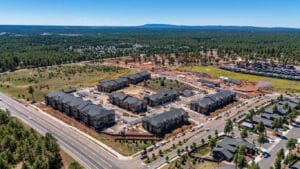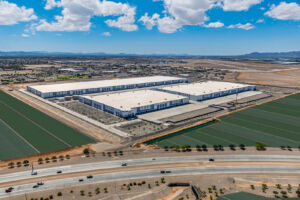 The former Revlon cosmetics and fragrance manufacturing plant, located in a South Phoenix industrial park, was originally built in the late 1960s and employed more than 900 people at its peak before eventually closing in 2001.
The former Revlon cosmetics and fragrance manufacturing plant, located in a South Phoenix industrial park, was originally built in the late 1960s and employed more than 900 people at its peak before eventually closing in 2001.
For more than 14 years, the 880,000-square-foot big box space sat vacant and shuttered. Today, it is home to a new tenant with new employees that are all part of a budding industry in Arizona – cannabis.
The adaptive reuse transformation of the Revlon building into the largest indoor cannabis cultivation facility in Arizona by True Harvest is just one example of the state’s cannabis-related real estate activity and the industry’s growth overall, which continues to attract investor interest while also creating jobs and real estate opportunities.
Marijuana isn’t a new topic by any means but it’s evolution into a legally regulated multi-billion-dollar industry for medical and recreational use is relatively new. And experts predict the cannabis industry is only expected to grow in Arizona, nationally and globally, as the industry evolves and more places consider legalizing medical and/or recreational marijuana.
Keep in mind, cannabis is still federally illegal for both medical and recreational use, which presents certain complex legal and financial challenges, but that’s not stopping cannabis pioneers and business entrepreneurs from capitalizing on ways to earn some green from the cash crop in Arizona.
Arizona passed Proposition 205 — the Arizona Medical Marijuana Act (AMMA) — in 2010, becoming the 14th state to make medical marijuana legal for adults over the age of 21. As of November 2017, the Arizona Department of Health Services (ADHS) reports more than 151,000 qualifying patients with medical marijuana cards.
Other states have gone even further. Since 1998, Washington D.C. and 29 states have legalized marijuana in some form, or at the very least, decriminalized possession or consumption of small amounts.
Future growth projections for the industry often times yield different results.
Arcview Market Research reports the regulated marijuana sales in North America totaled $6.7 billion in 2016, and it predicts sales to increase to an estimated $20.2 billion by 2021. Globally, Ameri Research forecasts the legal cannabis market to be valued at $63.5 billion by 2024.
Now locally, the ADHS reports, nearly $280 million worth of medical cannabis sales in 2016, which generated roughly $30 million in tax revenue. In total, Arizonians consumed 29 tons of medical marijuana throughout 2016, which is more than double last year’s amount.
Laura Bianchi, partner at Scottsdale-based Rose Law Group has been on the forefront of the legal cannabis movement since 2010 when the firm first launched its Cannabis Department, which Bianchi leads as the director.
She describes the changes and evolution of the cannabis industry in Arizona since then as “tremendous.”
“It has become much more business-like, professional and normalized,” she explains. “It’s a functioning business like any other business and I think people in Arizona see it as another business that brings growth and benefits our economy.”
Over the years, people became more educated and aware of Arizona’s medical marijuana program, its regulations and rule-making process, Bianchi says, and as a result, “people became far more comfortable and supportive.”
According to the Arizona Medical Marijuana Clinic, the state’s cannabis industry supports more than 4,680 full-time jobs across Arizona, which includes growers and dispensary employees, but also ancillary service jobs — such as lawyers, accountants, title companies, builders, insurance and real estate agents to name a few — much like any other traditional business.
Bianchi says, “Overall, we think it has evolved well over time into a very well-regulated cannabis market that investors are interested in.”
In Arizona, those investors already include companies like Kaylax Development, a private real estate investment trust focused on the cannabis industry, which currently manages a 23,600-square-foot cultivation facility in Mesa, and Innovative Industrial Properties Inc., a Maryland-based provider of creative real estate capital solutions to the medical-use cannabis industry.
Both companies and similar groups have spent millions of dollars in Arizona to turn vacant warehouses into state-of-the-art cultivation facilities and empty retail spaces into licensed dispensaries.
In December, Innovative Industrial Properties closed on the acquisition of a 350,000-square-foot greenhouse and industrial property in Wilcox for $15 million via a 15-year, sale-leaseback transaction with a subsidiary of The Pharm, which sells products in nearly half of Arizona’s retail dispensaries.
Among the first people to start cannabis-centric businesses in Arizona were father and son duo, Bill and William Grant Brothers, which had the first licensed indoor cultivation site regulated by the ADHS as well as the first licensed greenhouse in the state.
They currently own Encanto Green Cross Dispensary, a 90,000-square-foot facility in Central Phoenix, and operate one of the largest marijuana cultivation sites in the state, which serves 13,000 local patients each year.
One of the main challenges to the industry is regulation and legal conflicts between state and federal laws. Since marijuana is still federally illegal, traditional lending opportunities are not available and deals are predominately done in all cash.
However, creative funding solutions involving blockchain technology and cryptocurrencies are in the works to provide an alternative.
Arizona-based SinglePoint, a publicly-traded cannabis and technology holding company, recently launched a proprietary bitcoin exchange to solve payment processing issues in the cannabis space.
“We are trying to give them an alternative to cash,” says Wil Ralston, president of SinglePoint.
In addition to over 100-people already using the beta version of the program, Ralston describes daily inquiries from people who want to use to program once it’s fully launched later this year.
Other cryptocurrencies for cannabis transactions already exist, including PotCoin and HempCoin.
Overall, Bianchi says, “The commercial real estate industry has certainly benefited from the cannabis industry.”
Since locations for cannabis-businesses are difficult to find because of regulations like zoning, she says, “I’m seeing land owners get 2-3 times per square-foot what they would have gotten previously because they are zoned or can be zoned for a cannabis-related facility.”
Ralston agrees. “It’s common to see a markup for 3-4-times what the land would otherwise cost for regular commercial zoning,” he says.
Bill Brothers describes it as the “marijuana premium” because of a deal’s risk to return ratio. In his experience, cap rates for marijuana deals can range from 12-16 percent.
Looking ahead, cannabis advocacy groups have already filed paperwork with the Arizona Secretary of State’s Office to start collecting enough signatures to get on the November 2018 ballot with an initiative to legalize cannabis for adults at least 21 years old.
If passed, Arizona’s industrial and retail sectors might experience another fundamental boost similar to what has been observed in more established cannabis markets like Denver, Colo.



